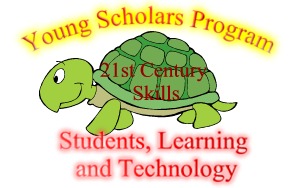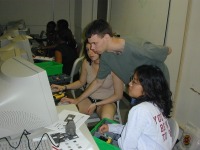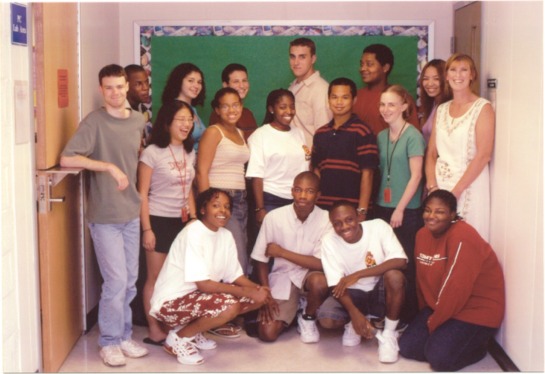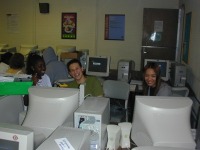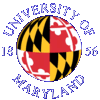 |
|
||||||||














EDUC 275
|

Can-Do Challenge Robot |
 Classroom |
|
Program Overview
The purpose of SLT is to foster excellence in 21st century skills which will help students succeed in college, and prepare themselves with the skills necessary to meet the shifting and constantly changing demands of the future workplace.
This course provides a means to explore technology applications essential to college success as well as opportunities to investigate career possibilities that connect education and technology.
The immediate goal is to attract a greater number of talented and diverse students to careers that interconnect the fields of education, science, math, and technology.
Students will participate in cutting-edge technology projects, robotic activities, and Logo-based computer learning environments in a hands-on setting, offering new technology skills, challenges, field trips and friendships!
- Foster excellence in 21st century skills including Digital Literacy
- Explore technology applications - Word, Excel, PowerPoint, Inspiration, Kidspiration, Microsoft Project, Blackboard, TappedIn, Wiki & Blogs, MOO Crossing
- Design, build, and program using MicroWorlds™, LEGO® Mindstorms™/Roblab™ , Squeak, ICONS, and StarLogo
Catalog Description
Explore and expand knowledge of essential 21st century skills (technology fluency and applications, team building, collaboration tools, problem based critical thinking), through gaming, modeling and simulation development, while investigating exciting careers that interconnect the fields of education and technology.
Course Description:
New technology is creating growth and opportunities in fields ranging from teaching to communications, geology to space science, and cryptography to computer forensics. Looking into the future, it is imperative that students are trained in key 21st century skills which will help them play a part in these fields and others, succeed in college, and prepare themselves with the skills necessary to meet the shifting and constantly changing demands of the future workplace.
This course allows students to explore and expand knowledge of essential 21st century skills (technology fluency and applications, team building, collaboration tools, problem based critical thinking), through gaming, modeling and simulation development, while investigating exciting careers that interconnect the fields of science, math, education and technology.
We explore the design and use of games and simulations in the classroom, and the research and development issues associated with each. We explore various modeling and simulation software packages (MicroWorlds, RoboLab, ICONS, Squeak, StarLogo), criteria for development, methods for evaluating the success, while also studying what and how people learn from programming and participating in games, models and simulations.
This course provides a means to explore technology applications essential to college success, as well as opportunities to investigate career possibilities that utilize technology. Students, Learning, and Technology will provide three weeks of dynamic and challenging activities through a variety of computer applications and Logo-based computer learning environments.
The underlying philosophy of Logo links pedagogy to programming in a tight bond. Logo's central theme is that the journey is the reward. The act of creating a program from scratch and debugging it is where the learning takes place. Once a Logo task is complete, the learner has accomplished two things: not only created a working program, but also, and more important, has developed or refined problem-solving strategies that can be applied to other tasks, whether computer-related or not. (David Thornberg, The Philosophy of Logo: the Most Important Attribute)
Field trips and guest speakers will show how programming and various technology-based applications are used in the modern work environment. Workshops will be hands-on and project-based aimed at learning the thought processes behind solving modern problems. Morning sessions will give students a chance to explore different technology applications (Word, Excel, PowerPoint, Inspiration, Kidspiration, Microsoft Project). Participants will explore, design, build, program, experiment and develop projects using one or more Logo-based computer learning environments (i.e. MicroWorlds™, LEGO® Mindstorms™/Robolab™ , Squeak, ICONS, StarLogo). Afternoon team activities will focus on designing, building and programming cybernetic devices via the LOGO language and LEGO® Mindstorms™ robotic construction kit. Students are exposed to other online formats (Blackboard, TappedIn, Wiki & Blogs, MOO Crossing) via their course activities and discussion. Students need only general computer awareness (basic keyboarding skills). As a culminating activity, student work and reflections will be incorporated into an E-portfolio.
To learn more and see student projects go to our YSP Student Site.
Previous Student Comments
2007 Harford County
- Pre-Assessment
- Scavenger Hunt [Word ... PDF]
- Overview Presentation [PPT ... PDF]
- Starlogo Files
- Baltimore Sun Article - Harford County Edition - July 22, 2007. Students Jump-Start Computer Training Program Teachers Joy of Technology to Eager Teens
2007 Prince Georges County
Previous Years
- Field Trips and Speakers
- 2006 Syllabus [PDF]
- 2005 Syllabus [PDF]
7
- Course Outline [Word ... PDF]
- Major Assignments
- Individual Animated Story (your beginning activity)
- Group Task 1 - Car/Dog
- Group Task 2 - Hurdle
- Group Task 3 - Animated Story
- Game/Maze
- ICONS Simulation Development [Word ... PDF]
- RoboChallenge
- ED-U-Invention
- E-portfolio [PPT]
- Flyer [Word ... PDF]
- Examples of Discussion Threads [Word ... PDF]
- How this course meets standards [Word ... PDF]
- 2004 Syllabus [HTML]
- 2003 Syllabus [HTML]
| Educational Technology Policy, Research, & Outreach http://www.edtechpolicy.org// dpruitt@umd.edu |
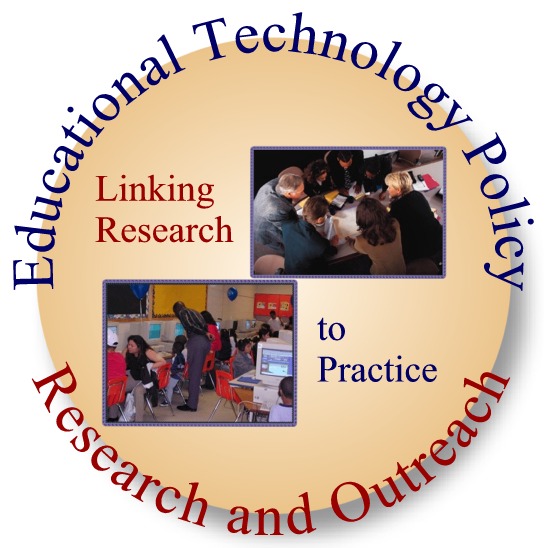 |
Copyright © 2009 ETPRO |


